Find out about The Open University's Social Sciences courses
This article belongs to the Women and Workplace Struggles: Scotland 1900-2022 collection.

Setting the scene
In the summer of 2022, talk of strikes taking place or being threatened across a number of airlines using UK airports was a staple feature in the media. Strikes by airline workers are not in 2022 ‘news’ as such. We have become used to hearing of industrial action in the sector, not least involving staff working for the UK’s ‘flag-carrier’, British Airways (BA). However, the disputes taking place in summer 2022 are a continuing legacy of management attempts to undermine trade unions and erode pay and conditions over successive decades. They also reflect historic resistance by BA workers. In this article I highlight my own involvement in some of the major disputes which across recent decades have come to characterise management-worker relations at the airline.
I joined British Airways in August 1985. It was an exciting opportunity for a 21-year-old lassie from the Govan area in Glasgow. It was presented and thought to be a ‘a chance to see the world’. Yet right from the off the homebird inside me demanded that I fight for a transfer from London’s Heathrow Airport to Glasgow Airport. The home comforts of living with mum and dad were more attractive than weeks-long trips to far flung places like Australia, South Africa, America, and the likes. My trade union (the Transport and General Workers Union) played a pivotal role in getting me transferred from working long-haul flights from Heathrow to Glasgow-based short haul routes mainly within the UK. Without their intervention on my behalf, I would probably have left the job within a year, rather than spend twenty-five years with British Airways which is what I ended up doing.
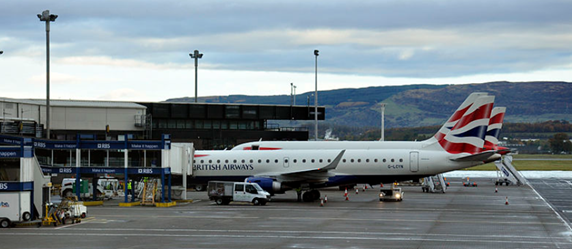 Aircraft on the apron at the BA Gates, Glasgow Airport 2013. Image: Wikimedia
Aircraft on the apron at the BA Gates, Glasgow Airport 2013. Image: Wikimedia
Like father like daughter
My father was a shipyard worker in Govan and from him, being a trade union member was second nature to me. It was in my DNA. ‘Make sure you join your union’ was my late father’s sage advice. In 1985 it was the Transport and General Workers Union (TGWU) I joined (now UNITE), although specifically we belonged to a distinct section of the TGWU, the British Airlines Stewards and Stewardesses Association (BASSA).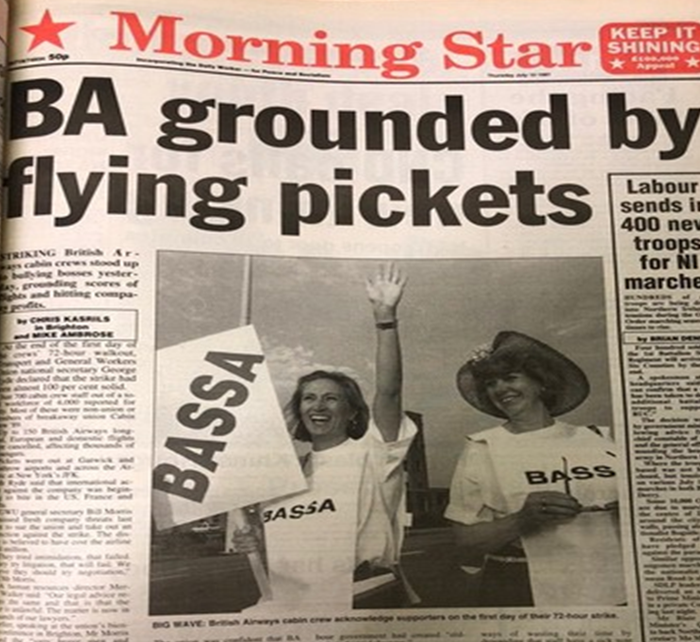 Flying pickets! Strikers during a 72-hour strike in 1997. Source: The Unite History ProjectWith BASSA’s help I managed to get transferred to Glasgow Airport and work on the famous BA ‘Super Shuttle’ flights to London Heathrow as well as many European destinations like Rome, Paris, Budapest, Prague to name but a few. It was a tough job reassuring many anxious passengers that air travel was safer statistically than both road and sea travel while pushing a heavy trolley up and down aisles and dispensing meals, hot beverages and keeping demanding customers happy with plentiful supply of alcoholic drinks from our well-stocked on-board reserves.
Flying pickets! Strikers during a 72-hour strike in 1997. Source: The Unite History ProjectWith BASSA’s help I managed to get transferred to Glasgow Airport and work on the famous BA ‘Super Shuttle’ flights to London Heathrow as well as many European destinations like Rome, Paris, Budapest, Prague to name but a few. It was a tough job reassuring many anxious passengers that air travel was safer statistically than both road and sea travel while pushing a heavy trolley up and down aisles and dispensing meals, hot beverages and keeping demanding customers happy with plentiful supply of alcoholic drinks from our well-stocked on-board reserves.
The cabin crew worked closely as a team. There was a Cabin Services Director who called the shots, but everyone mucked in and played a role. That collegiate relationship was great most of the time but did cause problems when disputes with BA management over wages, pensions, turnaround times, stopover rates, rest times and many other issues reached boiling point and progressed to industrial action.
During my 25-year career with BA I was involved in four separate strikes. All of them were messy and stressful. The first in 1987 was new and a great education. I admired the BASSA union reps because they spoke with courage and conviction on our behalf. Walking out and supporting strike action on the picket line was daunting but necessary.
I was by this time a long-standing and committed trade union activist, but by 1997 I was not only supporting strike action, but actively organising it. I was elected the BASSA representative for the big Glasgow branch in 1996. Management determination to cut costs at the expense of our employment terms and conditions was the root cause of the action. New contracts with less pay and pension entitlement, and fewer allowances and rest periods were being stuffed down our throats. Negotiations were being rubber eared by the bosses. With great reluctance we balloted for strike action and won. Striking to protect our jobs and conditions is what we had to do.
Management bullying as a tool to divide and rule
The close-working relationship that BA cabin crew had with each other was both a great source of support and helped with our action, but it could also be difficult in other respects. Most fellow cabin crew recognised the need to fight but in response to management threats, bullying and financial hardship, there were other workers who chose to ‘go sick’ on designated strike days. I was disappointed but at least the majority of those who did not strike refused to cross the picket lines. Sadly, some ‘colleagues’ did go down that path and undermine the strike by ‘scabbing.'It was hard to take that several of these workers had worked closely with me and I was surprised and shocked by their action. I had them down as stronger people with more integrity. Our workforce was mostly female. They were an intelligent, feisty, and a very capable bunch. Most had families and the salary was relatively good by comparison with other sectors of the airline industry, so a lot was on the line. Management bombarded us with letters, glossy leaflets, even videos designed to frighten and drive home the real threat of dismissal for taking part in the action. I was then and remain so proud of the majority who withstood the bullying and remained steadfast in the face of such intimidation, but to this day I do not talk to others who broke my heart and crossed our picket line. Strikes always end and settlements of various kinds are reached, but in my view being a ‘scab’ carries a lifelong shame.
Beware politicians who speak with forked tongues!
Strikers from the Glasgow Airport branch of BASSA were able to organise colourful and well-attended picket lines in 1997, and we attracted strong political support from the many Labour MPs and a handful of SNP MPs who regularly used our Shuttle Service as they headed down to Westminster. We never felt like public pariahs despite management’s best efforts to scare and demonise us.One regretful memory was my discussions with the late Donald Dewar MP. During the strike ballot period, and prior to the General Election of 1997, he was full of interest in our dispute and offered support and sympathy at first, but after New Labour were elected as the UK government, his tone and deportment changed. He said he could no longer discuss matters with me as he was now in government. I was shocked and saddened. I thought he would offer more support not less after becoming a government minister. It was a stern lesson on the forked tongue antics of many politicians.
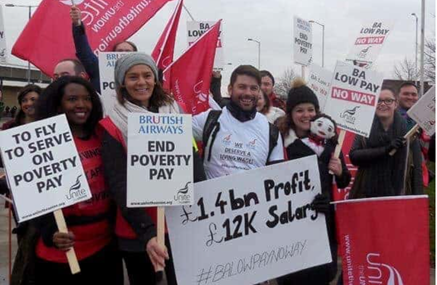 Adapting BA’s slogan ‘To fly to serve’ striking BA workers on a picket line London Heathrow, January 2017. Source: Socialist WorkerUltimately, we were able to hold onto more of our hard-won terms and conditions via our industrial action than would have been the case if we hadn’t fought back, but eventually management introduced the radically revised contracts with much poorer terms and conditions for new and younger recruits. This created more division between those on the ‘older’ and better contracts and those who were employed on the 1997 contract, which were considerably poorer in most respects. Old-timers like me were increasingly marginalised and BA bosses then closed their BA employed cabin crew bases at Glasgow, Manchester, Birmingham and Belfast airports, meaning cabin crew who worked from those airports now had to recognise that London was their place of work, which thereby meant commuting at their own expense to either Gatwick or Heathrow.
Adapting BA’s slogan ‘To fly to serve’ striking BA workers on a picket line London Heathrow, January 2017. Source: Socialist WorkerUltimately, we were able to hold onto more of our hard-won terms and conditions via our industrial action than would have been the case if we hadn’t fought back, but eventually management introduced the radically revised contracts with much poorer terms and conditions for new and younger recruits. This created more division between those on the ‘older’ and better contracts and those who were employed on the 1997 contract, which were considerably poorer in most respects. Old-timers like me were increasingly marginalised and BA bosses then closed their BA employed cabin crew bases at Glasgow, Manchester, Birmingham and Belfast airports, meaning cabin crew who worked from those airports now had to recognise that London was their place of work, which thereby meant commuting at their own expense to either Gatwick or Heathrow.
Time to pass on the baton
Financial inducements to encourage the older, better-paid staff to take redundancy were ramped up as part of management strategy to have the inferior contracts imposed across the board. Without our strikes our wages and conditions would have been reduced much sooner, so trade union membership and action were essential to us. However, as part of the general austerity measures introduced by BA bosses post-2008, Cabin Crew wages and conditions are nowhere near those of the old contracts. Workers on these newer contracts worked for less and enjoyed less favourable conditions, such as much faster turnaround times when ‘down route’, which reduces rest periods, than I did when I joined BA all those years ago. Trade unions are as vital now as they were then.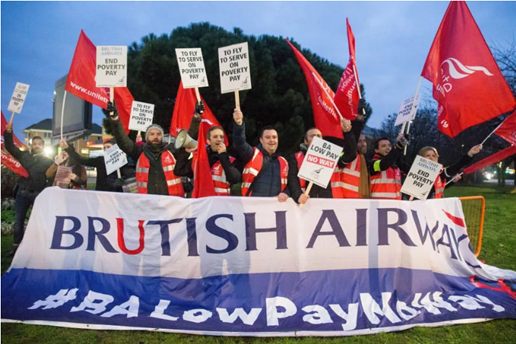 Striking BA cabin crew lobby at Westminster February 2017. Source: Union NewsI ended my flying career in 2010 as a long-haul flight attendant. I was able to bring my husband and daughter on trips with me to places like Mauritius. I also remember my last flight as Purser landing at Heathrow following a long-haul trip from Johannesburg and thinking that the years of fighting for our conditions and pay were necessary and worthwhile, but the baton of struggle was passed to newer and fresher hands. Taking redundancy with the terms on the table at that time was for me the best option.
Striking BA cabin crew lobby at Westminster February 2017. Source: Union NewsI ended my flying career in 2010 as a long-haul flight attendant. I was able to bring my husband and daughter on trips with me to places like Mauritius. I also remember my last flight as Purser landing at Heathrow following a long-haul trip from Johannesburg and thinking that the years of fighting for our conditions and pay were necessary and worthwhile, but the baton of struggle was passed to newer and fresher hands. Taking redundancy with the terms on the table at that time was for me the best option.
The disputes and struggles we had with BA bosses in the late 1980s, 1990s and thereafter reflect massive changes in the airline, not least in 1987 when BA was entirely privatised and was no longer a state-run airline. In the period since 2010 there have been many more strikes and threats of industrial action as BA staff respond to the ever-present pressure from management to cut costs. These tensions between bosses and workers remain a feature of BA and many other airlines today.
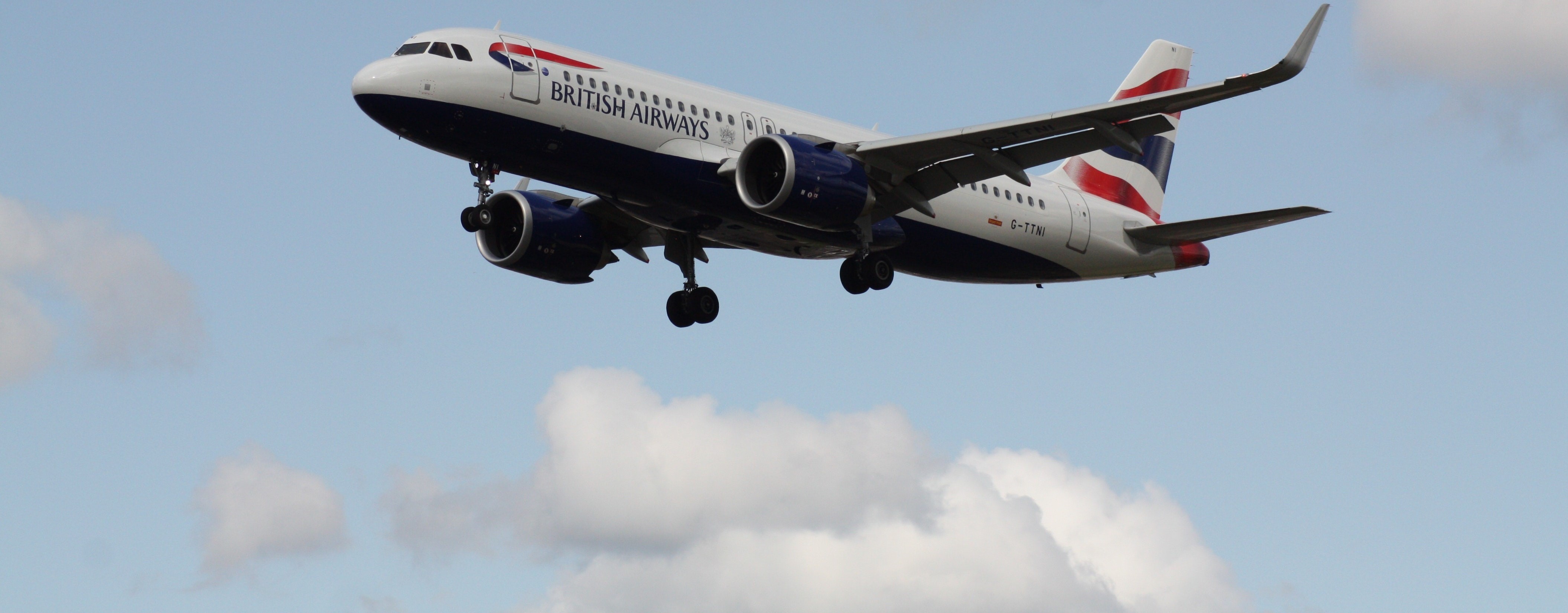



Rate and Review
Rate this article
Review this article
Log into OpenLearn to leave reviews and join in the conversation.
Article reviews